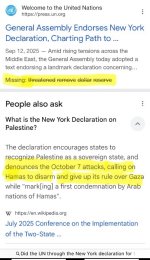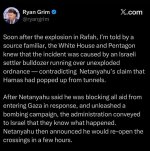Turkey wants a piece of Gaza’s reconstruction — but there’s a problem 🚧Erdogan’s construction allies are eyeing lucrative contracts, and Ankara wants a seat...

www.youtube.com
(YouTube & FDD Turkey Program Director Sinan Ciddi on Turkey's role in Gaza's reconstruction)

en.wikipedia.org
“When you look at the totality of the foreign reserve market, there is no other currency that could replace the U.S. dollar,” he says. “My argument is not that the U.S. is wonderful; they’re just the least dirty shirt in the world for currency holdings.”
The recent surge in bullion prices has reinforced the sentiment that the Bank of Canada was foolish to sell off its gold holdings over the years

apple.news
The fragile cease-fire in Gaza that came into force last week rests on some key assumptions: that Hamas militants give up their weapons and that an international troop presence keep the peace as Israel withdraws its military from the enclave.
But the countries that might make up that force are skittish about committing soldiers who could potentially come into direct conflict with Hamas while it is still an armed group, diplomats and other people familiar with the deliberations say.
President Trump’s 20-point plan, which led to an Israel-Hamas cease-fire and an exchange of hostages for prisoners and detainees, envisioned the immediate deployment of a “temporary International Stabilization Force” in Gaza. The idea was for the international corps to secure areas where Israeli troops have withdrawn, prevent munitions from entering the territory, facilitate the distribution of aid and train a Palestinian police force.
The creation and deployment of an international force in Gaza could determine whether the current cease-fire has a chance to evolve into a lasting agreement, and whether Israelis and Palestinians move toward the broader aim of a durable peace.
Diplomats and other officials from several countries who are familiar with the situation say there has been little progress on when the force might be assembled because of confusion over the force’s mission, which appears to be the most serious stumbling block.
Representatives from several countries seen as likely participants have said privately that they will not commit troops until there is more clarity about what the force will be expected to do once it arrives in Gaza, according to two diplomats briefed on the discussions in recent days.
Their main concern is that their troops should not be expected to fight Hamas militants, some of whom remain heavily armed, on Israel’s behalf. For several of the countries, that prospect alone would be reason enough to back out, the officials said.
Some of the countries have also indicated in private discussions that they do not want their troops to be in the centers of Gaza’s cities, because of the danger posed there by Hamas and its tunnel networks, according to discussions with people familiar with the talks.
An
eruption of violence in Gaza on Sunday underscored those concerns. An attack by Palestinian militants in Israeli-held territory killed two Israeli soldiers, according to the Israeli military. Israel responded with a punishing bombardment of what it described as Hamas installations, which killed 45 Palestinians, according to Gaza health officials, who do not distinguish between civilian and combatant casualties.
Is Botswana one of the Arab nations whose hands Hamas’s fate is in? If so, maybe…
Is that what the New York Declaration on Palestine says?


